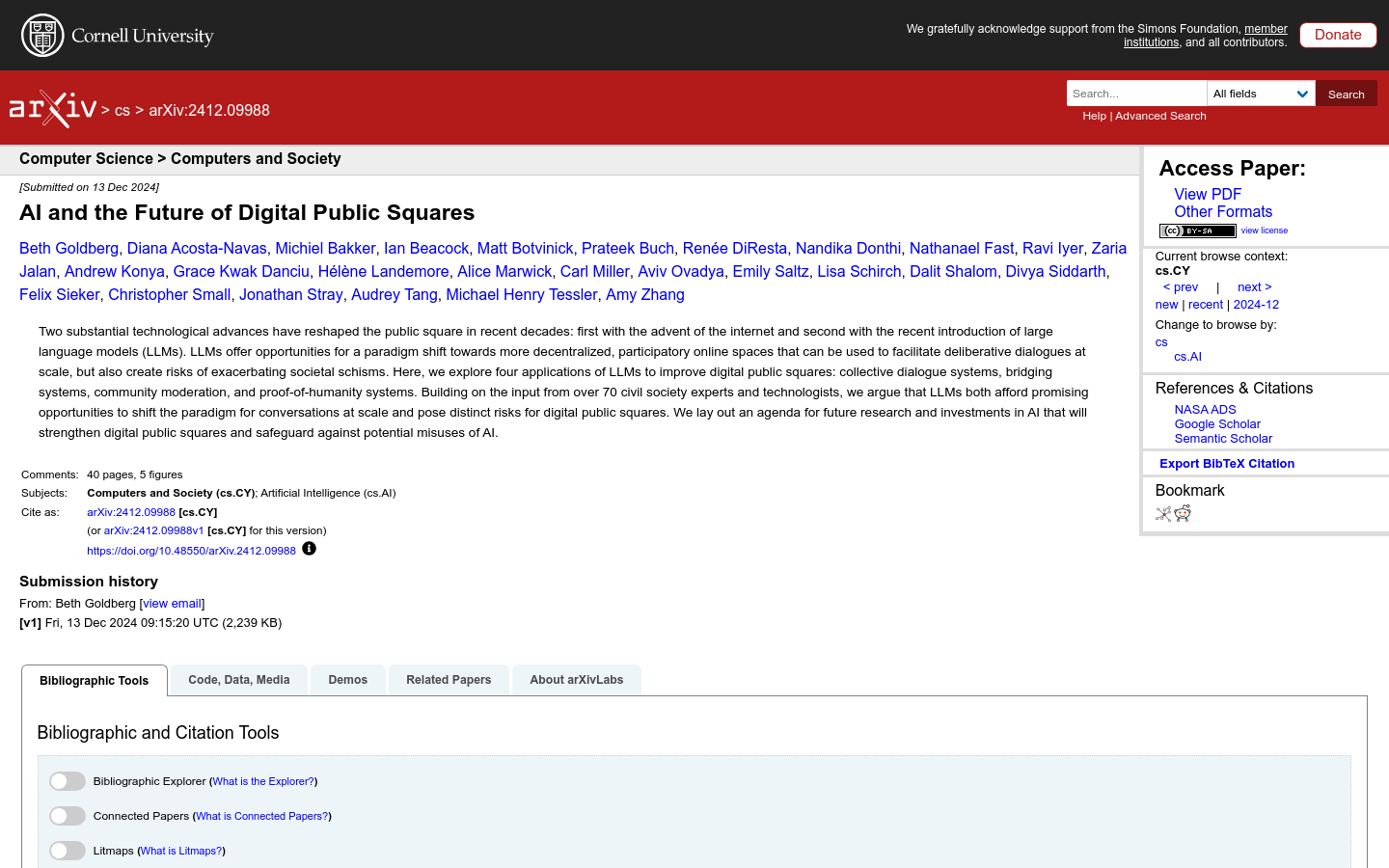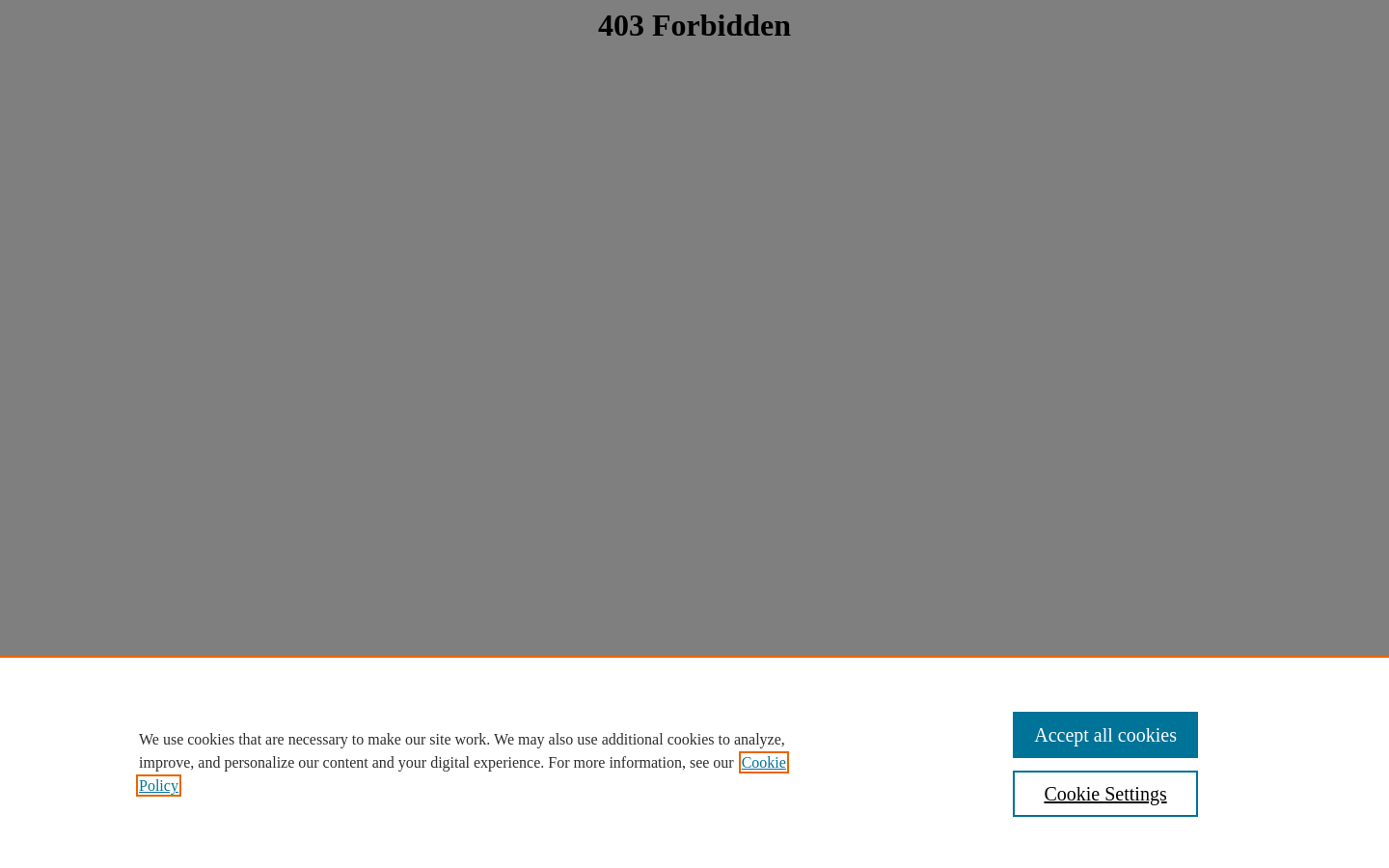Civic Tech Field Guide
Sharing knowledge and productively growing the fieldThe People > Learn about civic tech > Academia > Peer-reviewed research - (97)
Collaborative research programs dedicated to investigate the relations between technology and civic engagement and other challenges around concepts like citizenship, participation, and democracy.
Showing 97 Results

The uneven reach of the state: A novel approach to mapping local state presence
Norway (Norge, Noreg)A machine learning model trains on geo-located survey data to predict state presence.

Here, we explore four applications of LLMs to improve digital public squares: collective dialogue systems, bridging systems, community moderation, and proof-of-humanity systems.

Improving Delivery of the Social Safety Net: The Role of Stigma
United States of America (the)Article in Journal of Public Administration Research and Theory by Jessica Lasky-Fink and Elizabeth Linos

Protests in the United States on Palestine and Israel, 2023–2024
Harvard University, Cambridge, MA, USAAnalyzes the size, rhetorical nature, and non-violent nature of the pro-Palestine protest wave, which it finds to be "the largest, most sustained US protests sparked by a foreign event" since their data became available in 2017. Published in Social Movement Studies

Using publicly available satellite imagery and deep learning to understand economic well-being in Africa
Stanford University, Serra Mall, Stanford, CA, USAArticle in Nature by Christopher Yeh, Anthony Perez, Anne Driscoll, George Azzari, Zhongyi Tang, David Lobell, Stefano Ermon & Marshall Burke

Journal of Democracy
Baltimore, MDFocusing exclusively on democracy, the Journal monitors and analyzes democratic regimes and movements around the world.

The Situate AI Guidebook: Co-Designing a Toolkit to Support Multi-Stakeholder Early-stage Deliberations Around Public Sector AI Proposals
Carnegie Mellon UniversityBy Anna Kawakami, Amanda Coston, Haiyi Zhu, Hoda Heidari, Kenneth Holstein

We propose an alternative platform model that the social fabric an explicit output as well as input. By E. Glen Weyl, Luke Thorburn, Emillie de Keulenaar, Jacob Mchangama, Divya Siddarth, Audrey Tang


In this paper, building on insights from the theory and practice of deliberative democracy, we provide a "Democracy Levels" framework for evaluating the degree to which decisions in a given domain are made democratically.

This article proposes, and presents results from, an online technology platform and a methodology, which can help depolarize sectors of society, with the specific application to the current divisive post-war landscape within Colombia.

AI can help humans find common ground in democratic deliberation
Stanford University, Serra Mall, Stanford, CA, USAGoogle DeepMind and Stanford researchers built the "Habermas Machine" and found that AI mediators generated more palatable summary statements of the discussions, as rated by participants, than human-written summaries, while still representing minority views in the final version.

Generative Agent Simulations of 1,000 People
Stanford University, Serra Mall, Stanford, CA, USAStanford + DeepMind study that used LLMs to simulate people with AI agents based on a 2-hour interview

More and Better! Diversifying electronic participation mechanisms and improving the online services offered by Portuguese municipalities
Guimarães, PortugalThe 2023 edition of the “IPIC – Portuguese Municipal Councils’ Online Presence Index” series of studies presents the results of the evaluation of Portuguese municipal councils’ websites.

Waymo partnered with dashcam company Nexar to analyze 500 million miles of driving, including 335 crashes, to create the 'largest ever’ dataset of pedestrian and cyclist injuries

"Importantly, people experiencing distress are more likely to engage in collective action on climate change or express a willingness to do so, even when controlling for several correlates of environmental behavior"

Evidence from Taliban-controlled Afghanistan shows that digital aid is a cost-effective, credible, and efficient way to reach vulnerable populations, in this case poor, tech-illiterate, female-headed households, in fragile states.

An open database of conversations ChatGPT had with people who believe in a variety of conspiracy theories, which can be filtered by the efficacy of the conversation in changing beliefs.

Empowering Indigenous Communities: Land Alienation in Tripura and Restoration through ICT Initiatives
India (Bhārat)Through a comprehensive analysis of various ICT projects, this study examines the success and challenges of using technology to protect and restore land rights.

The Impact and Opportunities of Generative AI in Fact-Checking
Washington state, USAPaper by ROBERT WOLFE and TANUSHREE MITRA, University of Washington, United States

When 'doing ethics' meets public procurement of smart city technology – an Amsterdam case study
Amsterdam[A] multi-stakeholder co-design project – including a citizen panel – is an integral part of the process in which the service is designed and realized

Academic analysis of open data on Github finds it's "one of the largest hosts of open data in the world and has experienced an accelerated growth of open data assets over the past four years."

#ISOJ
Austin, TX#GotaGoGama, which criticized Gotabaya's candidacy and highlighted human rights abuses.

The aim of this study was to assess the current use of smartphones by the masons of the informal settlements of Iringa, Tanzania, and to identify pathways for improving their construction practices.

Understanding journalism impact: A multi-dimensional taxonomy for professional, organizational and societal change
United States of America (the)Drawing on literature from multiple disciplines, we propose a multi-faceted metric which future researchers, journalists and news agencies will be able to use when analysing media impact.

The Decidim ‘soft infrastructure’: democratic platforms and technological autonomy in Barcelona
Barcelona, SpainPaper by Paolo Cardullo, Ramon Ribera-Fumaz, and Paco González Gil. "In this paper we focus on the platform’s ‘soft infrastructure’ – the network of developers, ethical hackers, academics, maintainers, advocates and activists, and city administrators but also the agreements with the city and the documentation produced – on its internal governance arrangements and the provincialising relationships these might entail."

Do Open Data Impact on Citizens’ Behaviours?
Taiwan (T'ai-wan)This study by Yuya Shibuya empirically analyzes the impacts of open data on behavioral change by investigating the case of Taiwan.

The state of Civic Tech Research in Africa: An Evidence Map
South Africa (South Africa, Afrika-Borwa, Suid-Afrika)The Evidence Mapping project aimed to create a common, up-to-date evidence/ knowledge base about civic tech in the African context, to improve support, decision-making and advocacy in relation to civic tech (including more broadly civil society innovation, tech for good and digital governance).

Tile2Net
United States of America (the)"an end-to-end open-source framework for creating georeferenced pedestrian networks from aerial imagery"

Do Open Meetings Affect Deliberation? A Comparative Study of Political Meetings In Two Institutional Settings
Norway (Norge, Noreg)A research article in the Journal of Deliberative Democracy by Espen Leirset

Empathy Helps Counter Hate Speech
Stanford University, Serra Mall, Stanford, CA, USAA team of researchers led by Dominik Hangartner, IPL co-director and professor of public policy at ETH Zurich, has joined forces with colleagues at the University of Zurich to investigate what kind of messages could lead authors of hate speech to refrain from such postings in the future

"Findings from this study presents a developed model that can support community engagement for urban innovation by specifying factors that influences community engagement for smart sustainable city development." by Bokolo Anthony Jr.

Journal of Deliberative Democracy (previously the Journal of Public Deliberation)
University of CanberraThe Journal of Deliberative Democracy (formerly the Journal of Public Deliberation) is an open access journal publishing articles that shape the course of scholarship on deliberative democracy.

Paper: LocalView, a database of public meetings for the study of local politics and policy-making in the United States | Scientific Data
Harvard University, Cambridge, MA, USAA paper published in Nature introducing a database of public meetings in the US

Research Excellence Framework Impact case study database
United Kingdom of Great Britain and Northern Ireland (the)"Documents put together by university departments that attempt to explain the reach of their research beyond academia."

A citywide experiment testing the impact of geographically targeted, high-pay-off vaccine lotteries
Philadelphia"We implemented a pre-registered, citywide experiment to test the effects of three high-pay-off, geographically targeted lotteries designed to motivate adult Philadelphians to get their COVID-19 vaccine...we do not detect evidence of any overall benefits."

Investigating the empirical case of urban biking activists in Madrid, we explore how the design of the digital platform Decide Madrid impacted the collaborative practices involved in digital participatory budgeting.

A collection of essays edited by Ana Brandusescu and Jess Reia featuring essays from participants of the AI in the City: Building Civic Engagement and Public Trust symposium that took place remotely on February 10, 2022.

How to increase public engagement in environmental issues is a central question in environmental communication and environmental psychology literatures.

Research with Code for America on CalFresh, by Donald Moynihan, Eric Giannella, Pamela Herd, and Julie Sutherland finds "hard evidence on the barriers administrative burdens pose."

The AI for Good Foundation engages on a number of fronts in order to continuously serve its core mission.

AI Now Institute
New York City, NY, USAThe AI Now Institute at New York University is an interdisciplinary research center dedicated to understanding the social implications of artificial intelligence.

The Reporters’ Lab
Duke University, Durham, NC, USAThe Reporters’ Lab is a center for journalism research in the Sanford School of Public Policy at Duke University. Our core projects focus on fact-checking, but we also do occasional research about trust in the news media and other topics.

Journal of Online Trust and Safety
Stanford University, Serra Mall, Stanford, CA, USAThe Journal of Online Trust and Safety is a cross-disciplinary, open access, fast peer-review journal that publishes research on how consumer internet services are abused to cause harm and how to prevent those harms.






